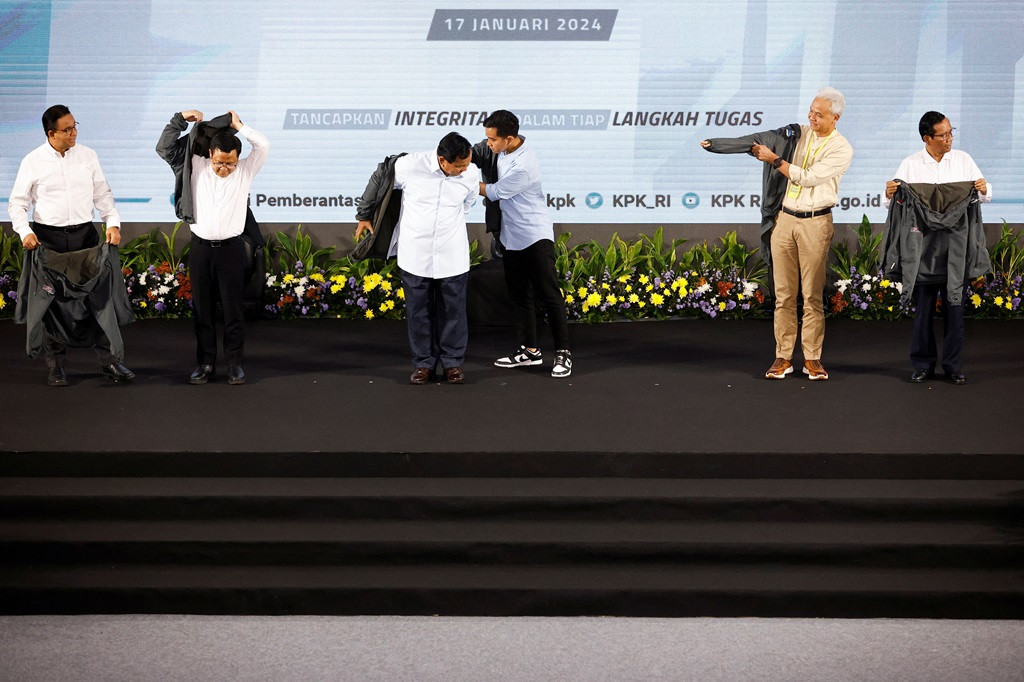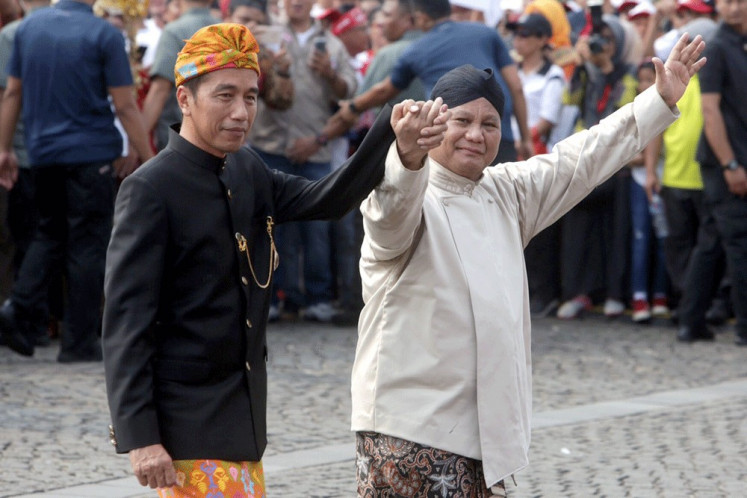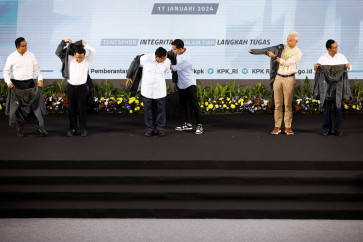Election 2024: MIT and INSEAD's X-Team insights in navigating the vote
Visioning in leadership is about crafting a strategic, inspiring vision. It is not just about setting goals; it is about framing a shared vision that resonates and unites.
Change text size
Gift Premium Articles
to Anyone
 Presidential candidates along with their running mates, (from left to right) Anies Baswedan, Muhaimin Iskandar, Prabowo Subianto, Gibran Rakabuming Raka, Ganjar Pranowo and Mahfud MD, pose for a group photo after delivering their anticorruption vision and mission during the Strengthening Anticorruption for State Apparatus (Paku Integritas) event held by the Corruption Eradication Commission (KPK) in Jakarta on Jan. 17, 2024. (Reuters/Willy Kurniawan)
Presidential candidates along with their running mates, (from left to right) Anies Baswedan, Muhaimin Iskandar, Prabowo Subianto, Gibran Rakabuming Raka, Ganjar Pranowo and Mahfud MD, pose for a group photo after delivering their anticorruption vision and mission during the Strengthening Anticorruption for State Apparatus (Paku Integritas) event held by the Corruption Eradication Commission (KPK) in Jakarta on Jan. 17, 2024. (Reuters/Willy Kurniawan)

As the general election approaches, we find ourselves at a crossroads. Three candidates, each backed by political parties and investors, stand ready to lead. Yet, the traditional democratic mantra of governance "of the people, by the people, for the people" seems to have evolved. In today's political industry (Porter, 2020), the dynamic appears to have shifted toward "from investors, by the people, to the investors”.
This transition is not inherently negative, as many investors are driven by a genuine desire to advance public welfare. Their success often translates into national growth, indirectly benefiting the populace. However, this shift does necessitate a more nuanced approach to selecting our leaders.
Our era is marked by a deluge of information, blending truth with falsehood, making it increasingly challenging to discern fact from fiction. This muddle of information often weaponized to sway public opinion, creates an environment where doxa (opinion) often overshadows episteme (knowledge).
In such a climate, the need for a straightforward, reliable tool to aid in the selection of our leaders becomes paramount. This tool must be accessible and understandable to the average citizen, enabling them to cut through the noise and make informed decisions that are in the best interest of the nation.
As we approach the upcoming general election, evaluating presidential candidates demands a nuanced and comprehensive approach. The 4-Caps+ Framework, conceptualized by Deborah Ancona of Massachusetts Institute of Technology (MIT) and Henrik Bresman of INSEAD (Ancona & Bresman, 2023), offers an insightful perspective on leadership assessment, focusing on four key capabilities: sense-making, visioning, relating and inventing, all centered around the pivotal concept of building credibility.
Sense-making is a critical skill in our chaotic and uncertain world. It involves the capacity to be open-minded, to release oneself from entrenched mental models and view the changing landscape with fresh eyes. This capability extends beyond just understanding current events; it involves learning from diverse experiences and insights.

Leaders adept at sense-making can create meaning from uncertainty, synthesizing complex information into a new map of reality. Experimentation is also a key part of sense-making, using trial and error to understand what works, iterating and adapting strategies for the best path forward.

















